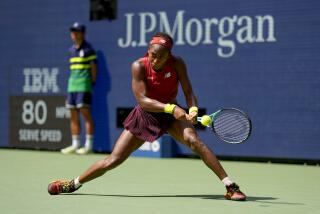WIMBLEDON : Graf’s Reign Gets Soaked by McNeil : Tennis: American, a 100-1 shot, avoids German’s backhand and scores a 7-5, 7-6 (7-5) upset.
WIMBLEDON — Their historic first-round match finally complete, Steffi Graf and Lori McNeil collected their belongings in Tuesday’s cloud-shrouded darkness and made their way off Wimbledon’s rain-slicked Centre Court.
McNeil, the unseeded American--the talent supposedly unfulfilled--left on cloud nine. Graf, the five-time Wimbledon champion who almost always leaves grass stains on anyone who ventures into her path, departed with a German glare that could have melted tungsten.
Such was the power of McNeil’s 7-5, 7-6 (7-5) victory over the previously grass-invincible Graf. It marked the first time in Wimbledon’s 108-year history that a defending women’s champion, a top-seeded defender at that, had been beaten in opening-round play.
Moments after McNeil’s match-winning forehand volley had eluded Graf, the players met at the net, exchanged handshakes and words. As best as McNeil could remember, Graf congratulated her and then muttered something else.
“She said, ‘Well done,’ and ‘Good match,’ and ‘Good luck,’ I think,” said McNeil, ranked 22nd in the world but considered a grass-court threat because of her serve-and-volley game.
This was only the second time in the last decade that Graf had dropped consecutive matches--one at the recent French Open and then Tuesday against McNeil. Graf was a 2-5 favorite to win the women’s championship here, McNeil a 100-1 shot.
But even the local bookies knew that Graf’s first-round draw was no sure thing.
That’s because in 1992, at the Virginia Slims Championships, Graf was defeated in the first round. The winner? The troublesome McNeil. Until Tuesday’s match, it was the last time the German superstar had exited so early.
Even Graf seemed slightly unimpressed by the day’s events. Upset? What upset?
“(It’s) not that big an upset because of who I lost to, I would say,” she said. “I mean, it was a very difficult first round and she has always the ability to play the top players, so it’s not that big of an upset.”
Perhaps sensing that they might be witnesses to history, the 13,118 who crammed Centre Court stadium at the All England Lawn Tennis Club braved two long rain delays and the blustery, cold winds of London’s mostly typical summer weather.
In all, the match took about five hours from starting serve to last tiebreaker point. Five hours for Graf to realize that her serves were something of a mess--she served only one ace--and five hours to score only one point off her serve-and-volley attack, which produced only two tries in two sets.
“She played better than me,” Graf said. “That’s very obvious.”
Never was it more obvious than at the end of the first set, when Graf double-faulted and handed McNeil the 7-5 advantage. Later, in the second set, Graf was ahead, 5-4, the serve hers. But rather than take control of the game, as she usually does in such situations, Graf faltered once more.
In need of a point to push the game to deuce, Graf barely missed on an ace, had to dink over a second serve and then pushed a backhand into the net. Score: 5-5.
Eventually, a tiebreaker was needed and again Graf made uncharacteristic mistakes. Ahead, 3-2, she promptly sent a smash into the net. Then she double-faulted, allowing McNeil to move ahead, 4-3, then, 5-3, then, 6-3.
It was as she faced match point, and with no margin for error, that Graf later said she felt she had no chance. She was right, as McNeil delivered the forehand volley that ended it all.
As Graf had continually failed to venture toward the net, McNeil began hitting shot after shot at the German’s backhand, considered the lesser of the star’s two evils. By doing so, it helped neutralize Graf’s power game.
“That was a big part of my strategy, to make her pass me off the backhand side,” McNeil said. “Everyone knows Steffi has a great forehand.”
Strategy is one thing, execution another. Before Tuesday, McNeil had never advanced past the Wimbledon quarterfinals and has made it to only one Grand Slam semifinal--at the U.S. Open in 1987. And even with the victory over Graf two years ago, McNeil’s overall record against the German star was 1-8.
But Tuesday was different. More precisely, McNeil was different. More mature, she said. More aware.
“It’s definitely the best win,” McNeil said.
McNeil’s best, one of Wimbledon’s biggest.
Meanwhile, Lindsay Davenport’s strange and wonderful June continued happily along as she defeated France’s Julie Halard, 6-1, 6-4, in her first-round match.
Davenport turned 18 two weeks ago, reached the third round of the French Open, went to her high school prom, attended her Murrieta Valley High graduation ceremony, watched as the school’s No. 1 court was named in her honor, left for London last Saturday, discovered that No. 7-seed Mary Pierce had withdrawn, took Pierce’s place in the draw, got a new hairdo and then beat Halard.
The first set was easy enough, Davenport taking only 22 minutes to win. But Halard recovered somewhat in the second set, forcing Davenport into an assortment of errors.
“She started to get a few more balls back in the second set and I was a little nervous,” said Davenport, the first American-born woman to reach the top-10 rankings since Jennifer Capriati did it in October of 1990.
Wimbledon Notes
Steffi Graf’s loss was everyone else’s gain in the women’s draw, especially Lindsay Davenport’s. When Mary Pierce withdrew from the tournament last Saturday, Davenport was moved into Pierce’s spot, away from fourth-seeded Martina Navratilova’s side of the draw to Graf’s side. But with Graf gone, Davenport’s chances of reaching the final improved significantly. . . . Graf, when asked if Lori McNeil is playing well enough to advance to the final: “I don’t think so, no.”
More to Read
Go beyond the scoreboard
Get the latest on L.A.'s teams in the daily Sports Report newsletter.
You may occasionally receive promotional content from the Los Angeles Times.










